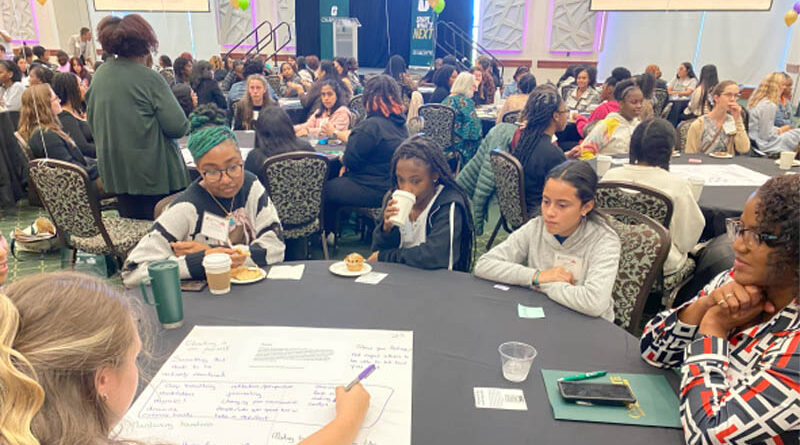Charlotte Urban Institute Report Finds Mental Health Impacts Success For Women
By ASHA ELLISON
Sure, girls just want to have fun – they also want to feel safe and supported.
A recent report authored by research associates Bridget Anderson and Mia Gaddy of the UNC Charlotte Urban Institute, found that women and girls in the Charlotte metropolitan area largely desire safe and inclusive spaces to thrive mentally, emotionally, and socially in school and work environments. Additionally, women and girls believe strong support systems, purpose-driven connections, and dynamic allyship help them to flourish.
Conversations conducted in October 2023 at the Women + Girls Research Alliance (W+GRA) Leadership Café at UNC Charlotte, resulted in more than 250 participant responses. Researchers then used Data Analysis, Integration, and Synthesis (DAIS), to draw significant insights about the state of women and girls in the local community. The responses, which answered questions centered on mental health and the ability of women and girls to succeed in school and workplace settings, were recorded following the World Café model. This integrated research method aims to garner meaningful insights through facilitated small-group conversations in a safe and welcoming atmosphere.
The findings, summarized below, show that mental health, educational and occupational success are intrinsically linked. Essentially, they go hand in hand.
So, how does mental health contribute to success at work and school for women and girls in Charlotte? It contributes plenty. The report reveals that engaging in positive mental health activities, as well inclusive spaces can help them in the following ways:
- Mental health practices can strengthen resilience
In fact, women and girls who use positive mental health interventions such as positive self-talk and boundary-setting, and who have positive social support networks, feel more resilient. - Belonging at school and work are essential for maintaining mental health
Cafe participants identified belonging as the sense of feeling valued, respected, and appreciated in a space. Participants feel this in the workplace when they are paid adequately and fairly, given paid leave (including maternity leave), and feel supported by their supervisors and peers. At school, students feel this when their athletic pursuits and activities were promoted at the same level as those for boys’, and when school policies – such as dress codes – are equally enforced, and done so in honorable ways.
Both groups indicated that existing in spaces as a minority, in class or field, could lead to feelings of isolation.
Additionally, here’s what women and girls identified as necessities to thrive in both environments:
Strong support systems
While women and girls both recognize therapy as an important tool for wellbeing, strong relational connections – family, friends, communities of faith, colleagues, teachers, and older mentors – were frequently identified as preferred resources to help navigate and manage life stress.
Safe spaces
Women and girls identify safe spaces as those where they share certain similarities with other group members such as life experiences, race, gender, and faith. Again, these are also places where they feel valued, respected, and appreciated.
Purposeful connections to work and activities
Women and girls want to feel connected to their work and contributions at school and in the workplace – and they feel this most when they align with the greater mission of the companies they work for, or when they feel that work provides an opportunity to care for their families.
For students? They find purpose through goal-setting and connecting with mentors about career and education aspirations.
Dynamic allyship
Women and girls look to their male counterparts to use their voices and the power differential to champion their needs and aspirations. But, they don’t want help in a vacuum. They also want to support men and boys – and are committed to advocacy through action.
To read the full report, findings and recommendations from the Charlotte Urban Institute, click here.

